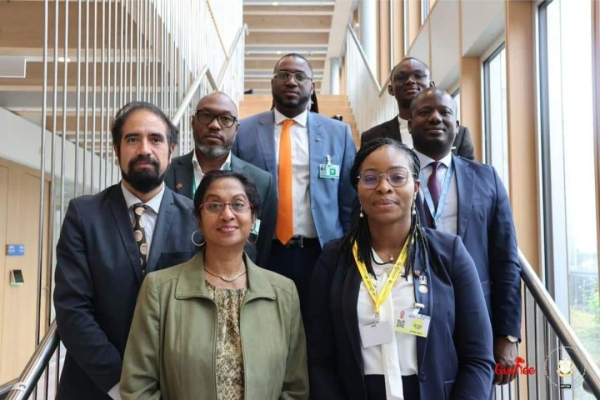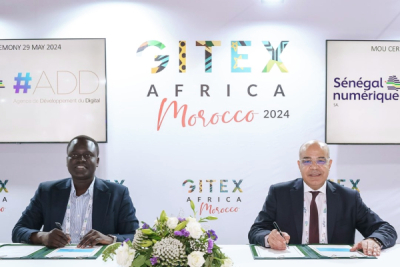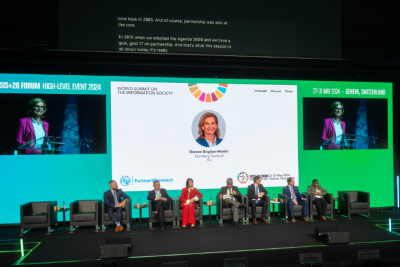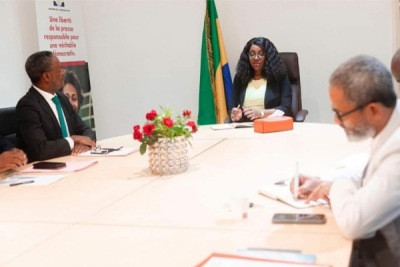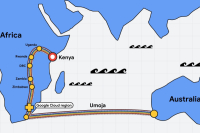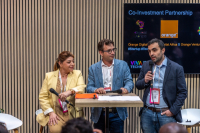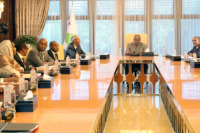
Tech (1152)
The Malagasy government is committed to ensuring the country benefits from the technological revolution. Alongside infrastructure development, it is also focusing on training a highly skilled workforce.
Madagascar is taking a step towards becoming a leader in artificial intelligence (AI) within the Indian Ocean region. On Friday, May 31, Malagasy Minister of Digital Development, Posts and Telecommunications Tahina Razafindramalo signed a partnership agreement in Marrakech, Morocco, with Professor Serge Miranda of the University of Côte d'Azur and École Supérieure des Technologies Industrielles Avancées (ESTIA) in France. The agreement launches a feasibility study for the establishment of an International Institute of Applied Artificial Intelligence for the Indian Ocean region.
According to the Malagasy Ministry of Digital Development, "the creation of this institute will stimulate innovation and economic growth in Madagascar, while providing increased opportunities in education and quality employment. This initiative also demonstrates that public-private partnerships can be beneficial for emerging countries."
The project involves a collaboration between DATUM Consulting - Groupe ArkeUp, ESTIA, and the Ministry of Digital Development. Aligned with Madagascar's Digital Strategic Plan (PSN) 2023-2028, the institute aims to position the country as a key player in AI within the sub-region. The PSN highlights a critical deficit of 40,000 technicians needed for successful digital transformation.
The feasibility study will assess the specific needs, required resources, and key implementation steps for the institute. It will also evaluate the economic, educational, and social impacts of the initiative. This evaluation will consider the challenges and opportunities of integrating AI into various economic and social sectors across Madagascar. This ambitious project aspires to not only bridge the technical skills gap but also establish Madagascar as a center of excellence in AI for the Indian Ocean region.
Although the e-commerce sector in Africa is promising, it still faces numerous challenges. The development of this sector requires close collaboration between various stakeholders.
The Republic of Guinea plans to collaborate with the United Nations Conference on Trade and Development (UNCTAD) to boost its e-commerce sector. The Guinean Minister of Posts, Telecommunications, and Digital Economy, along with her team, discussed this initiative with Shamika Sirimanne, Director of Technology, Innovation, and Research at UNCTAD, on the sidelines of the World Summit on the Information Society held in Geneva from Monday, May 27 to Friday, May 31.
"The objective of this meeting was to explore avenues of cooperation between Guinea and UNCTAD, particularly in the field of e-commerce. Minister Pricemou presented the state of digitalization in Guinea, highlighting the challenges and opportunities," stated the ministry's communiqué.
During the meeting, Guinea sought UNCTAD's support for developing a regulatory framework conducive to the growth of e-commerce and for enhancing the digital skills of Guineans through technical assistance.
The UN organization welcomed this request and committed to facilitating contacts within the United Nations system to promote digital and postal services in Guinea. Additionally, it recommended close collaboration between the Ministry of Posts and the Ministry of Commerce to foster the development of trade in Guinea.
This meeting between the Guinean Ministry of Digital Economy and UNCTAD is part of the government's ongoing efforts to promote the e-commerce sector in Guinea. This rapidly growing sector was already valued at 10 million dollars in 2020, with an annual growth rate of 20%, according to the Foundation for E-commerce and Distance Selling (Fevad).
Samira Njoya
To fulfill its mission, the Digital Development Agency (ADD) requires the collaboration of multiple stakeholders. The Moroccan public entity has recently signed several partnerships to this end.
The Digital Development Agency (ADD), Morocco's agency in charge of implementing the national digital strategy, signed a series of strategic partnerships during the second edition of Gitex Africa, a technology fair being held in Marrakech since May 29th.
The partnerships involve Sénégal Numérique SA, the National Observatory for Children's Rights (ONDE), the National Agency for Digital Development of the Comoros (ANADEN Km), Crédit Agricole du Maroc, Indra (a Spanish leader in technological solutions), the Moroccan Agency for Tourism Development (SMIT), and APEBI (the Federation of Information Technology, Telecommunications, and Offshoring).
The agreement with Sénégal Numérique SA prioritizes knowledge and experience sharing as well as system interoperability. This collaboration aims to improve the efficiency of public and private services and promote digital inclusion alongside the development of digital platforms and applications.
The partnership with ONDE aligns with ADD's "Digital Culture / Online Child Protection" action plan and focuses on fostering a safe and child-friendly digital environment.
ADD and Indra, the Spanish technology leader, will collaborate to develop innovative solutions specifically tailored to Morocco's needs. This partnership aims to enhance the country's digital competitiveness.
The agreement with Crédit Agricole du Maroc focuses on experience sharing, training programs, and skill exchange in the digital domain. This collaboration aligns with ADD's ongoing efforts to promote digital careers, raise digital awareness, and support the entrepreneurial ecosystem.
Meanwhile, the partnership with ANADEN Km, the Comoros' digital development agency, covers the sharing of experience, best practices and digital transformation strategies. It notably aims to improve human resource capacities through training and awareness programs focused on the appropriate use of digital tools.
A tripartite agreement between ADD, SMIT, and APEBI was also signed to spearhead the digitization of Morocco's tourism sector.
These collaborations build upon the agreement signed with Visa, a global leader in digital payments, on May 17th. This earlier partnership supports the government's initiatives in financial inclusion and digital development.
Investment commitments in the digital sector are crucial for African development. With its vast underserved population, Africa can greatly benefit from enhanced digital connectivity. These investments address critical barriers like affordability and adoption, fostering an inclusive digital society.
The International Telecommunication Union (ITU) announced, on May 27, $4.8 billion in new investment commitments to boost global connectivity. This brings total pledges through its Partner2Connect Digital Coalition (P2C) to $50.96 billion, nearing its $100 billion target for 2026.
The announcements were made at the World Summit on the Information Society (WSIS)+20 Forum in Geneva. The new pledges leverage artificial intelligence (AI) to enhance digital access and inclusion.
"Closing the digital divide requires a team effort, and today we scored a huge win for global connectivity," said ITU Secretary-General Doreen Bogdan-Martin.
Key commitments include $106 million from Elle International to improve digital connectivity for 20 million women and girls in South Africa and a new pledge from Microsoft to prioritize AI projects that include people with disabilities, among others.
According to the ITU, approximately 5.4 billion people (67 percent of the world’s population) were using the Internet as of 2023, leaving 2.6 billion people still offline. This statistic underscores the significance of ongoing investments in digital connectivity, particularly in regions like Africa. With a substantial portion of the global population still disconnected, initiatives aimed at increasing digital inclusion are crucial for fostering a more inclusive digital society.
Hikmatu Bilali
Digital technologies are crucial for driving economic growth, innovation, job creation, and social inclusion. However, Sub-Saharan Africa (SSA) grapples with significant challenges in digital development, such as underdeveloped infrastructure and costly connectivity. Entry into the African telecom market with 5G infrastructure is pivotal for African development, promising to enhance digital inclusion, spur economic growth, reduce costs for local telecom operators, and hasten technological progress.
Reliance Industries Ltd (RIL) is set to enter the African telecom market by providing 5G shared network infrastructure through its subsidiary Radisys, in collaboration with Next-Gen Infrastructure Co. (NGIC), backed by the Ghanaian government. Radisys announced this on May 27.
"By bringing Fixed Wireless Access alongside 4G and 5G cellular services to help drive economic growth and digital inclusion, Radisys looks forward to helping Ascend and NGIC build a disruptive and affordable shared broadband infrastructure across Ghana," said Arun Bhikshesvaran, CEO of Radisys.
Radisys, owned by RIL's unit Jio Platforms Ltd (JPL), along with Tech Mahindra and Nokia, will collaborate with NGIC to develop 4G and 5G networks across Africa, starting with Ghana. NGIC plans to invest $200 million in this initiative over the next three years, offering the networks as shared resources to local mobile operators to cut costs. With partnerships already established with AT Ghana and Telecel Ghana, NGIC aims to replicate India's low-cost, high-speed data model, providing affordable and efficient digital services across the continent.
This investment aligns with the strategy outlined in August 2023 by Owusu-Ekuful, Ghana’s Minister for Communication and Digitisation, during the 12th African Peering and Interconnection Forum (AfPIF). She disclosed the government's decision not to issue a 5G license, which would require significant investment from telecom operators. Instead, the government plans to establish a neutral shared infrastructure company to provide the necessary networks to operators.
Andrew Dabalen, the World Bank's Chief Economist for Africa, emphasized that increasing mobile internet usage could create jobs and spur economic recovery. A 2023 World Bank report (Digital Transformation Drives Development in Africa) revealed that extreme poverty decreased by around 7% in Nigeria and Tanzania, and labor force participation increased by up to 8% after three or more years of internet coverage. Addressing these gaps is crucial for fully harnessing digital technologies' potential in SSA.
Hikmatu Bilali
The COVID-19 crisis significantly impacted the postal sector, and the subsequent surge in digitalization has further disrupted the market, forcing postal services to contend with innovative competitors. This challenge is particularly acute in Africa, where postal services must adapt and reinvent themselves to remain relevant.
Equatoguinean investors, represented by INVERFIN, met with Gabon's Minister of Communication and Media, Laurence Ndong, on Thursday, May 23rd, to discuss potential investments in the country's postal and telecommunication sectors.
The investors signaled their interest in supporting Gabon's postal service (La Poste SA) in its digital transformation initiatives. The discussions also explored backing an economic group formed by La Poste SA, Télédiffusion Gabon (TDG), and Universal Services for expanding telecom network coverage in underserved areas.
According to a Facebook post by Minister Ndong, INVERFIN expressed willingness to "fully finance La Poste SA's digital projects" across the tri-border zone (Gabon, Equatorial Guinea, Cameroon) and beyond. The investment seeks a return based on a memorandum of understanding (MoU) currently under legal review by La Poste SA and the Ministry.
This financial support aligns with Gabon's Digital Plan and the Universal Postal Union's (UPU) directives, emphasizing the need for La Poste SA to adapt and capitalize on e-commerce, e-government, and digitalized financial services. The UPU's 2023 Integrated Index for Postal Development (2IPD) ranks Gabon's postal development as "weak" with a score of two out of ten.
“INVERFIN representatives are expected to return to Libreville in a few weeks for the final signing of the memorandum of understanding,” Minister Ndong's post informs.
As part of its initiatives in Africa, Google is significantly increasing its investments in digital infrastructure. The goal is to harness the opportunities presented by the internet economy, contributing to a prosperous and sustainable digital future for the continent.
Google on Thursday announced the Umoja fiber optic cable project, aiming to significantly enhance the reach and reliability of digital connectivity across Africa. This initiative aligns with Google's broader Africa Connect strategy, following the successful deployment of the Equiano cable connecting Africa to Europe.
The Umoja network leverages a partnership with Liquid Intelligent Technologies to establish a terrestrial segment connecting Kenya, Uganda, Rwanda, the Democratic Republic of Congo, Zambia, Zimbabwe, and South Africa. From South Africa, a subsea connection will traverse the Indian Ocean to link directly with Australia.
Google's investment in Umoja comes at a critical juncture. Recurrent outages in existing subsea cables serving Africa have resulted in widespread internet disruptions. The most recent incident occurred on May 12th, when failures in the SEACOM and EASSY systems caused disruptions in several East and Southern African countries. Similar issues arose in March, affecting numerous cables – WACS, MainOne, ACE, SAT3, Seacom/TGN, AAE1, and EIG – impacting internet access across a dozen West, Central, and Southern African nations.
"This initiative is crucial in ensuring the redundancy and resilience of our region’s connectivity to the rest of the world, especially in light of recent disruptions caused by cuts to sub-sea cables," stated Kenyan President William Ruto. "By strengthening our digital backbone, we are not only improving reliability but also paving the way for increased digital inclusion, innovation, and economic opportunities for our people and businesses."
Isaac K. Kassouwi
Limited access to financing remains a critical hurdle for startups, especially in Africa and the Middle East. Bolstering these startups fosters innovation, creates jobs, and energizes the regional digital economy.
Orange Ventures, the investment arm of telecoms giant Orange Group, and Digital Africa, a pan-African initiative supporting early-stage businesses, joined forces on Thursday to co-invest in startups across the Orange Digital Centers (ODC) network in Africa and the Middle East.
The partnership, announced on the sidelines of the Vivatech technology fair in Paris, underscores both organizations' commitment to fostering innovation and growth within the region's burgeoning digital economy.
"Orange Digital Centers are true catalysts for innovation, where ideas take shape and dreams become reality," said Asma Ennaifer (pictured left), Executive Director of CSR, Communication, and the Orange Digital Center program for Orange Africa and the Middle East . "By joining forces with Orange Ventures and Digital Africa, we're giving African startups the means to thrive and make their mark in a rapidly expanding digital world."
This initiative builds upon a strategic agreement signed between Orange and Digital Africa in June 2023 to streamline financing and support for ODC network startups. Under the new collaboration, the partners can leverage Fuzé, an investment scheme implemented by Digital Africa, to potentially double the funding offered to individual startups through joint application review and co-investment.
This enhanced partnership marks a significant step towards bolstering support for African entrepreneurs within the ODC network. In its first year, the previous collaboration provided funding of up to €50,000 to five startups through the Fuzé program. With Orange Ventures now on board, the initiative is expected to empower a growing number of African entrepreneurs from the early stages of their ventures by offering comprehensive financial and strategic backing.
Samira Njoya
Investing in digital infrastructure is a significant step for African development as it is crucial in enhancing government efficiency, improving data management, and fostering economic growth. By integrating advanced technology, Nigeria sets a precedent for other African nations to modernize their operations, support digital transformation, and boost overall development.
Nigeria will launch a state-of-the-art data center with a storage capacity of 1.4 petabytes before May 29, 2024, to house critical national information, including citizens' bio-data. The Minister of Interior Dr. Olubunmi Tunji-Ojo announced this during a meeting with the National Union of Nigerian Associations in Italy (NUNAI) on May 20, a statement from the Interior Ministry dated the same day revealed.
Dr. Olubunmi Tunji-Ojo emphasized that adopting advanced technology would enhance efficiency and accountability across national operations, the statement read.
In its 2019 publication titled “Nigeria Digital Economy Diagnostic: A Plan for Building Nigeria’s Inclusive Digital Future,” the World Bank assessed that “Nigeria is capturing only a fraction of its digital economic potential and will need to make strategic investments to develop a dynamic, transformative digital economy.” In line with this, in 2015, the Nigeria Communications Commission proposed transitioning the economy into a digital economy through investments in digital infrastructure.
The launch of this data center directly addresses this assessment, marking a strategic investment in Nigeria's digital infrastructure. This move is expected to unlock more of Nigeria's digital economic potential, promoting an inclusive and robust digital economy.
Hikmatu Bilali
Djibouti has embarked on an ambitious effort to digitize its public services. This initiative aims to allow the country to reap the full benefits of the digital economy.
The Djiboutian government announced the upcoming launch of two new digital services: e-Cabinet and e-Building Permit. Unveiled at the 8th Council of Ministers session on Tuesday, May 14th, these initiatives aim to modernize governance, enhance administrative efficiency, and offer a digital solution for building permits.
Developed by the Ministry of Digital Economy and Innovation with technical support from the National Agency for State Information Systems (ANSIE), e-Cabinet expands the government's document management capabilities. This platform caters to high-level decision-making by providing advanced features for managing proposals, agendas, reference documents, and legal texts throughout their lifecycle. Additionally, it ensures seamless interaction between various government systems, centralizing document management and fostering secure communication.
As for the e-Building Permit platform, it will replace the current building permit issuance system which is now considered outdated. This new solution includes an online portal offering significant advantages for all stakeholders involved in the building permit issuance process. Key features include simplified permit submission, online payments, and real-time tracking of applications.
The deployment of these platforms is part of the "Djibouti Fondement Numérique," a project that also includes the development of national broadband infrastructure, the promotion of e-learning, and the improvement of the quality of telecommunications services at affordable prices.
These digital solutions are expected to digitize government decision-making processes, facilitate secure communication and document sharing between ministries and government entities, and significantly save time in processing services.
Samira Njoya
More...
The global adoption of blockchain technology is accelerating. Governments around the world are taking notice, exploring its potential to bring greater transparency and efficiency to their operations.
Ghana is poised to become the first African nation to adopt blockchain technology for its government operations, according to Vice-President Mahamudu Bawumia. The announcement was made during the 14th regional conference and annual general meeting of the heads of anti-corruption agencies in the Commonwealth of Africa, held in Accra from May 6 to May 11.
"We are going to adopt blockchain technology for government to ensure that all data and transactions in the Government space are transparent and tamper-proof, no one can change them, and so ours could well become the first blockchain-powered government in Africa," stated Bawumia.
This initiative is part of Ghana's Digitalization Strategy, which has been in place since 2017. The strategy has enabled the government to collect 201 billion GH₵ (approximately $14.2 billion) since 2023 through the digitization of public services via the Ghana.gov platform. Additionally, the new digital ID card has allowed the government to detect 404,707 fictitious names on the payroll of the National Service System and 29,000 phantom pensioners.
By adopting blockchain, Ghana aims to secure government data in a fail-safe manner. According to Bawumia, this technology will serve as a bulwark against corruption by monitoring every modification made to digital data.
Blockchain is an advanced database mechanism that allows for transparent sharing of information across a network. It can be used to record contracts, financial transactions, digital assets, votes, and much more, in a decentralized and secure manner.
Samira Njoya
Morocco is firmly committed to digital transformation. Recognizing that human resources are the cornerstone of this endeavor, the country is implementing initiatives to modernize educational programs by integrating digital skills from an early age.
The University of Moulay Ismail signed a partnership agreement with Cisco Network Academy, a global online learning platform offered by American technology giant Cisco Systems, on Wednesday, May 8.
This collaboration, established during a visit by a Cisco Network Academy delegation to Morocco, is designed to equip students and faculty with in-demand digital skills in critical areas like computer networking, artificial intelligence, programmable infrastructure, and cybersecurity.
The initiative aligns perfectly with Morocco's "Pacte Esri 2030," the National Plan for Accelerating the Transformation of the Higher Education, Scientific Research, and Innovation Ecosystem by 2030. This strategic plan emphasizes preparing students with the necessary personal, cross-disciplinary, and digital skills to meet the evolving demands of the job market, reflecting both royal directives and the global digital revolution.
The partnership builds upon a tripartite agreement signed last December between the Moroccan Ministry of Higher Education, the Ministry of Digital Transition and Administrative Reform, and Cisco.
Furthermore, this new collaboration aims to strengthen the training and certification programs offered through the "Centres code 212" hosted by Moroccan universities. Students and teachers will gain free, unlimited access to Cisco's partner training programs, along with support in preparing for industry-recognized certifications.
By prioritizing youth training and upskilling the population in digital capabilities, Morocco seeks to cultivate a robust pool of graduates equipped with specialized knowledge in innovative fields. This initiative aims to accelerate the nation's digital transformation journey and position Morocco as an attractive destination for both domestic and international investors.
Samira Njoya
The Gambia has made significant progress in its digital transformation journey. To advance even further, the country is receiving support from the organizations it belongs to, such as ECOWAS.
The President of the Economic Community of West African States (ECOWAS) Commission, Omar Alieu Touray, and the Gambian Minister of Digital Economy, Ousman A. Bah, signed a grant agreement on Friday, May 3, during the 15th Summit of the Organization of Islamic Cooperation (OIC).
This $180,000 grant aims to strengthen The Gambia's digital infrastructure and enhance the country's governance through new technologies.
This initiative is part of an ECOWAS strategy to strengthen the digital capabilities of all its member states. It comes at a time when The Gambia is intensifying its efforts to accelerate digital transformation and improve telecommunications infrastructure to provide its population with innovative new services.
Currently, the country is working on a comprehensive digital strategy set to launch in the coming months. Additionally, The Gambia is preparing to connect to a second international fiber optic submarine cable, funded by the World Bank at a cost of $30 to $35 million. The government is also considering enhancing national connectivity via satellites.
The ECOWAS grant is expected to support the implementation of this strategy, which includes digitizing administrative services, improving citizens' digital skills, and creating a standardized digital identification system, among other initiatives.
Samira Njoya
The Burundian government has pledged to modernize services offered to citizens. However, several regions of the country still lack comprehensive internet coverage and digital skills, limiting access to digital services in these areas.
On Monday, April 29, the Ministry of Communication, Information Technology, and Media announced the launch of a national survey on ICT access and usage among households, businesses, and public administrations in Burundi. This initiative aims to assess the state of digital service usage and access while identifying the knowledge and needs of the Burundian population.
According to Thierry Kitamoya (photo), Assistant to the Minister for ICT, this survey is part of the Digital Economy Foundations Support Project (PAFEN), financed by the World Bank to the tune of $92 million. The PAFEN aims to expand broadband internet access for underserved populations, enhance the government's capacity to provide digital services, and lay the groundwork for accelerated digital economy development in Burundi.
The survey, which began on April 29, will continue until May 17, led by the Burundian Center for Population and Development Studies (CERPED) and the Tunisian company SFM Technologies. The survey will target varied samples across different communes and provinces to provide a comprehensive overview of ICT access and usage in Burundi.
The survey results will inform the design and goals of digital access programs, the formulation of new broadband policies, and the assessment of ICT penetration levels in Burundi.



